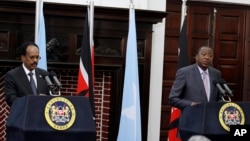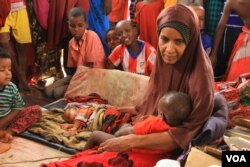The Kenyan government says it will open the border with Somalia to boost trade and allow the flow of people between the two countries. Kenyan President Uhuru Kenyatta also pledged to help Somalia in the fight against al-Shabab militants and support and train government workers. His remarks followed a meeting he had in Nairobi with his Somali counterpart, Mohamed Abdullahi Mohamed.
After a closed door meeting that lasted more than three hours, the two heads of state addressed the media in a display of friendship.
President Kenyatta discussed the border issue.
"We agreed to take the following actions within the shortest possible time, open two border posts, in Dobley-Liboi and Mandera-Bula Hawa, and to facilitate the movement of people, goods and services," he said.
The borders have remained closed for the last two-and-a-half decades since Somalia descended into conflict; however, people living along the borders and refugees have found a way to get into Kenya.
Kenya has also agreed to train 500 Somali men and women in different economic fields including teaching, nursing, and administration, to help in their country’s rebuilding and recovery.
Despite the optimism expressed by the two leaders, the threat of Somali militant group al-Shabab exists, and both countries have reaffirmed their commitment to defeating the organization.
Kenya has also had issues with Somali refugees living at the Dadaab refugee camp, in the northeast of the country.
The east African nation plans to close the refugee camp, the world's largest, by the end of May, but, in what some say might be a change of heart, Kenyatta says his government will build a training institute at the camp to educate high school graduates.
Education
“Kenya will establish a technical training institute for youths currently in the refugee camps as well as the environs of Dadaab and this I believe will greatly help in providing these young men and women the necessary skills they will require to develop and grow Somalia,” said Kenyatta.
Thousands of Dadaab high school graduates can not join universities and training institutes in Kenya because they are confined to the camps.
Somali President Mohamed Abdullahi Mohamed says the latest economic collaboration will improve the security of the region.
“Close economic cooperation between Kenya and Somalia will not only help to improve the lives of our millions of people but will also enhance the security situation in East Africa. Therefore my government is ready to work very closely with your government in the realization of full economic cooperation between our two nations,” he said.
The two eastern African countries also agreed to cooperate on security issues to confront the threat of al-Shabab in the region.





